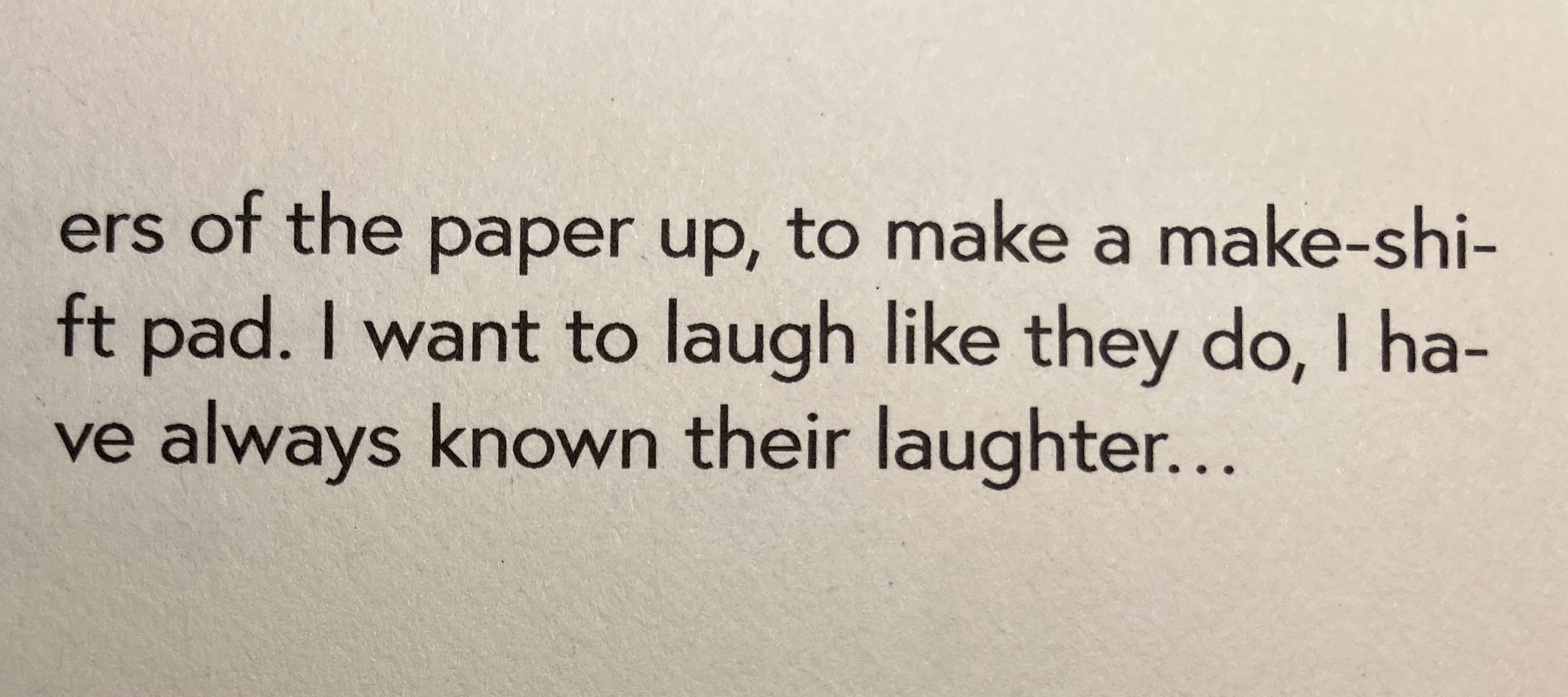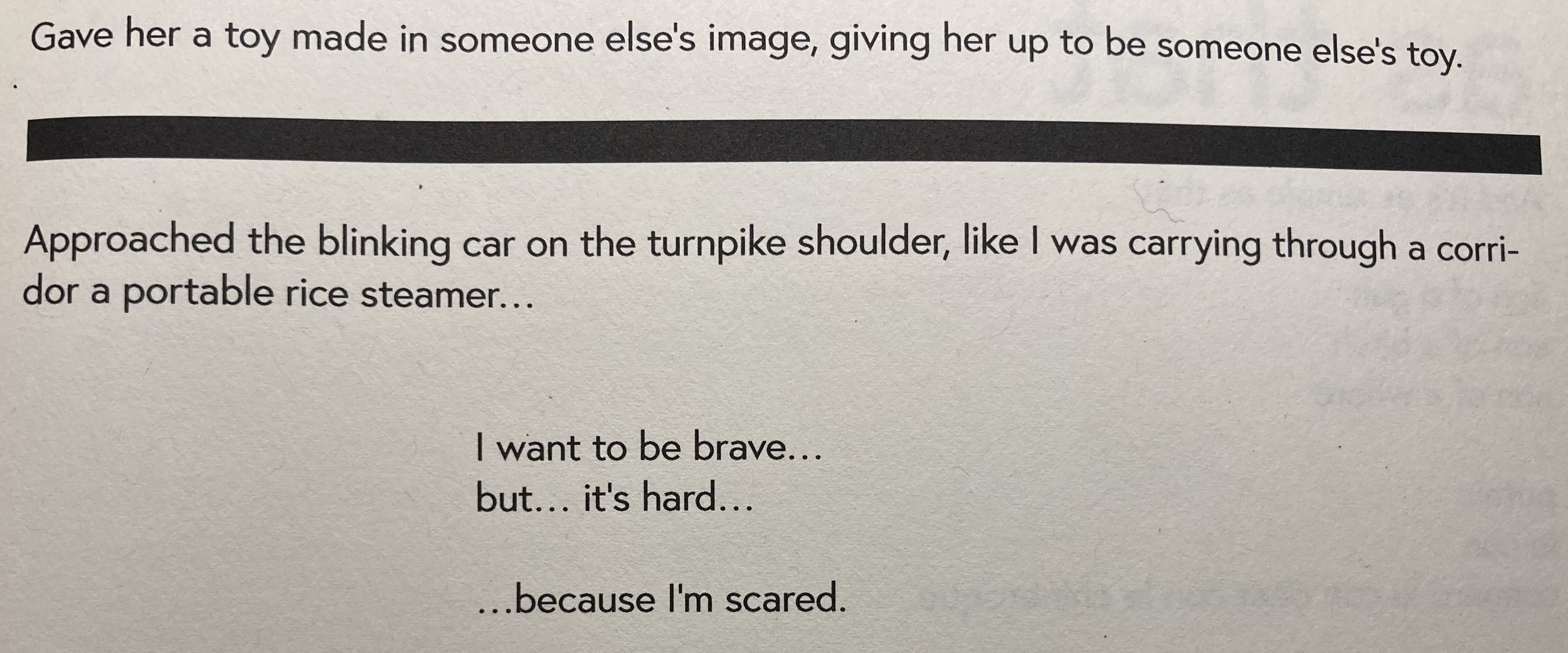outside voices, please: An Interview with Valerie Hsiung
Clarissa: I’d like to start with some thoughts on process and how a book comes together. I always love hearing about how a writer takes a project from idea to a fully fledged book. How did this project evolve and develop from the initial idea to the book’s final form?
Valerie: Rarely does anything I write begin from what I would consider to be an idea. I think the closest thing to an idea would be a feeling, a sound, an atmosphere, a group of words that repeats in my head, likely all of these things mixing together to form something that becomes another substance. outside voices, please is made up of several sequences, some of which are kept together, like the two opening “Test” sections, and some of which have been scattered throughout the main body of the book. The earliest sequences to have come about were the filmic ones, “Just like that it all disappeared,” “Come on / Say goodbye / And she nudges the childhood forward,” “I gotta go,” “She gives the infant cotton candy,” “About a decade later,” which are all heavy on a specifically embodied feeling and a specific character-story-location interaction, along with the hard gem ones, “Cry me a moon,” “Pause pause pause”, “Vaporizer gang,” “Coin tossed,” “Don’t act like you know who I am,” which work with language differently, in topography, in declaration, in abstraction, in its conception of what a lyric even is—maybe these two strains weren’t initially or at least consciously written with the other in mind but at some point a space was probably subtracted between them and the rest of the book was maybe addressing, at times filling in, at times emptying further, that hole. At a certain point enough of that space is aggravated, filled (with dirt, trash, secrets), visited or traversed, that it becomes a larger thing taken together. More than most things I’ve written, outside voices, please has an agglomerative quality to it, especially on the level of the page as a unit. Though I’m often braiding and wefting, the units vary. I notice how in outside voices, please the “poem as unit” becomes a zone of separation between these two strains, however you might describe them.
Clarissa: I don’t think writers always get enough room to talk about particular points of pride in their work, so I would like to ask: what are your favorite lines, poems, or moments in this book?
Valerie: These parts are especially frontal in my present thinking space, maybe because there is something in them that abolished, even if momentarily, certain dichotomies and walls in my mind…
“I want to laugh like they do, I ha- / ve always known their laughter…”
“Approached the blinking car on the turnpike shoulder, like I was carrying through a corri- / dor a portable rice steamer…”
“I felt this overwhelming finality…”
Clarissa: One of the things that really intrigued me in this book was your use of negative space. You use it in such a variety of ways: encoding your last name in the text, the script-like portions of the book, pages that only contain a couple phrases, and then the striking contrast of the “Head of the Snake” poems, which occupy the full page and contain very little negative space. What were the driving forces behind your approach to negative space?
Valerie: When it became apparent that there would be these personal archives braided throughout the work, the redactions and embeddings arrived not because language isn’t already full of redactions and embeddings without an additional visible marker, but because it seemed important to make it hyper visible, to underscore these archaeological aspects of language, and to make it one of the first encounters of those portions of the text. When I listen to my friends who work primarily with paint or sculpt from physical objects and color, I’m amazed when they speak about white space and negative space. I don’t think that way. If something was marked out and became a part of the negative space, I left the act of marking it out present because with the archive, you’re dealing with simultaneous abundance and paucity. Things have been erased before you ever found them yourself and also you decipher it in the way you want or have to decipher it, maybe because that’s the only way to actually hold onto anything amongst the stacks of documentation, but that’s also an erasure.
Clarissa: I found your use of italics powerful. In these poems, phrases and passages in italics seem to function both as an author's note and as a continuation of the poem. The italicized language furthers the poem's context while still participating in the poetic language in a way I found very interesting. Could you talk more about your use of italics?
Valerie: There is a kind of conversation that runs throughout an archive that is and isn’t the conversation we partake in in daily life–there’s the daily conversation that takes place between two beings, a call and response, but there’s also the daily conversation that takes place within the self, and then there’s also the conversation between these conversations. Within this somewhere is also the active remnants of an archive, which also might call or respond, intervene.
Clarissa: Some of your poems are constructed like miniature scripts, with a cast list and stage directions. This construction, which suggests the possibility of performance, often seems to heighten the surreality of the language in these poems. In writing this book, how were you thinking about the relationship between poetry and performance?
Valerie: What I’m interested in with the script is the way it exists also as a suggestion, the interpretation occurs not just in a hold of reading but in movement, occupation of space, twisting and turning, and not as a solo operation, you might put together an entire team to configure an occupation of space actually. But as a script flattened onto the page, that suggestion is postponed. Only right now matters. But you can’t forget that there is a possibility for enactment. But only right now matters.
Valerie: All of my poetry is tended under the influence of songs, performance, and ritual, but I think when I was working through this book, the way I thought about poetry and performance was maybe in such a way that a single self that might carry the poem, the book, from beginning to end, was not only resisted, but completely exploded (as opposed to beginning and ending with a single self through which one’s (multiple) severances and alienations explode over an extended duration). These are very different types of cell division, different portals. I think, durationally, at its longest, this (a single self carrying something from one point to another point) occurs only for a few pages at a time in outside voices, please, if that.





